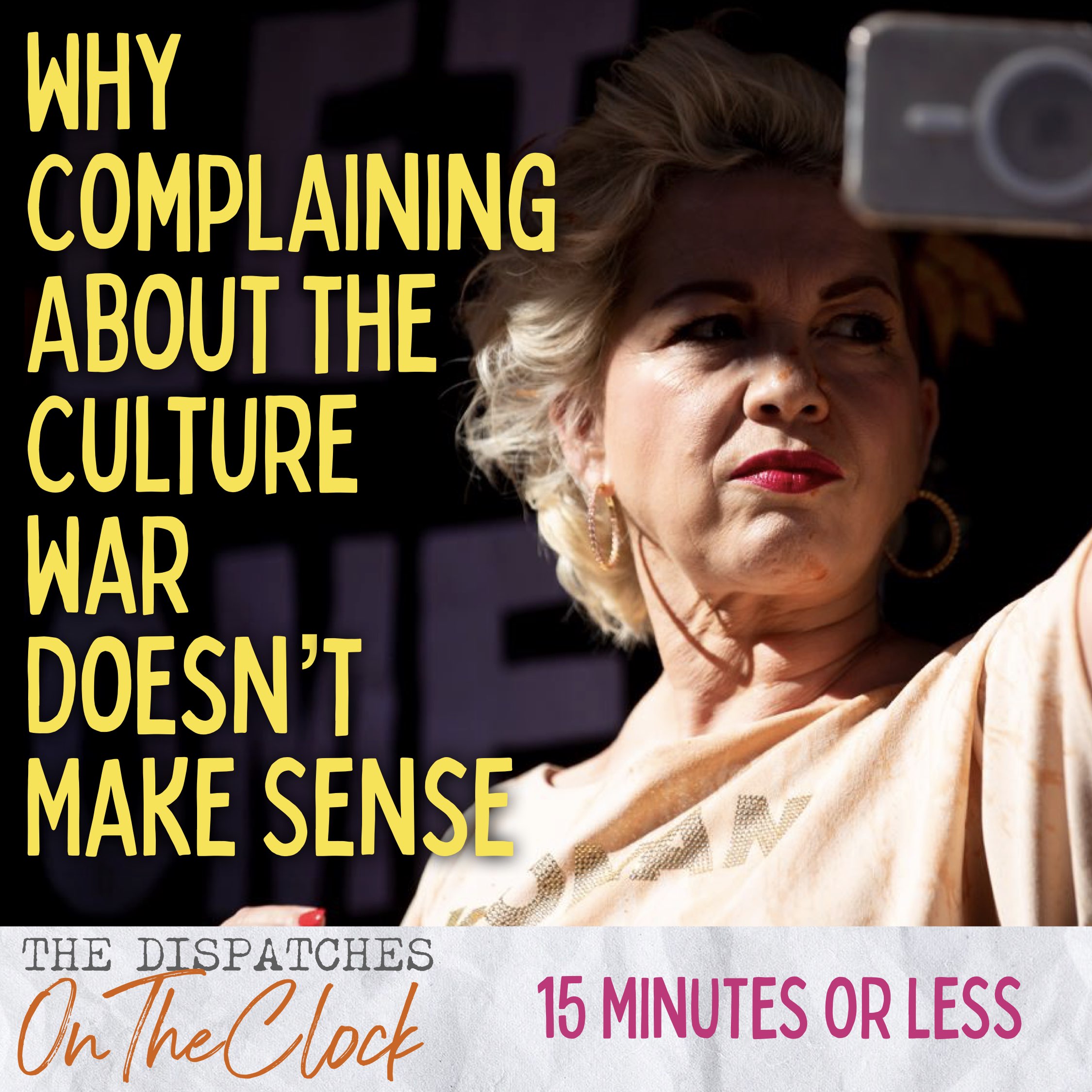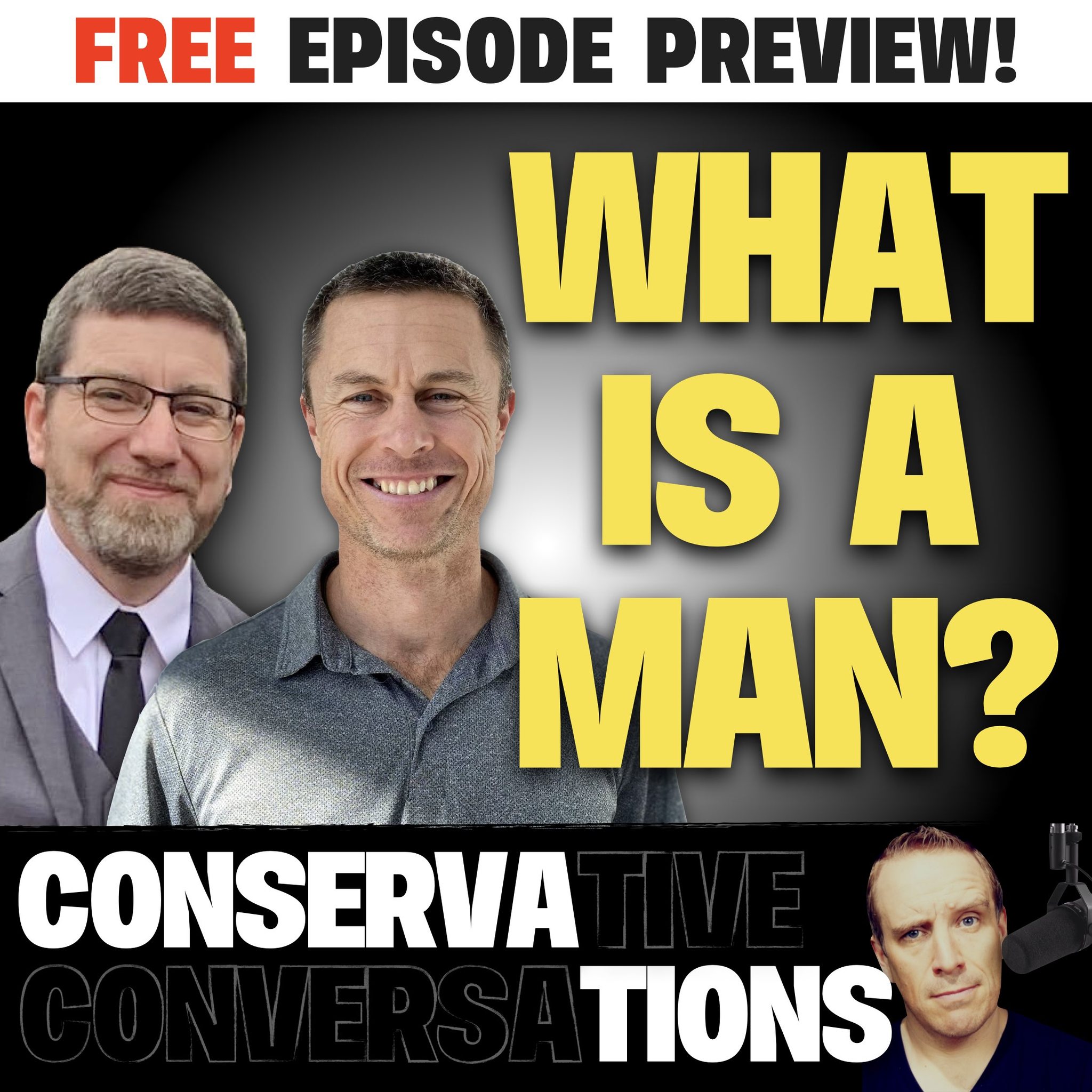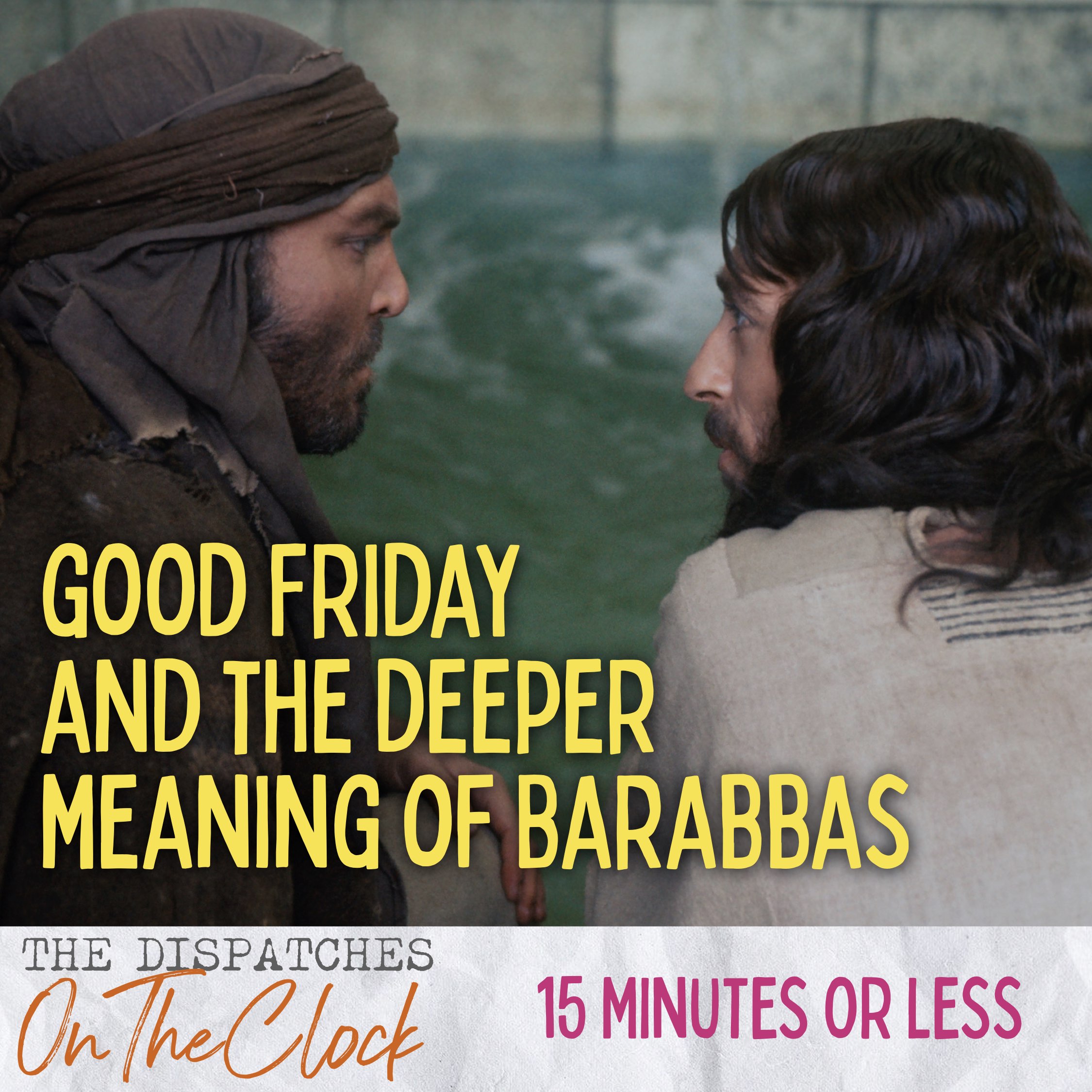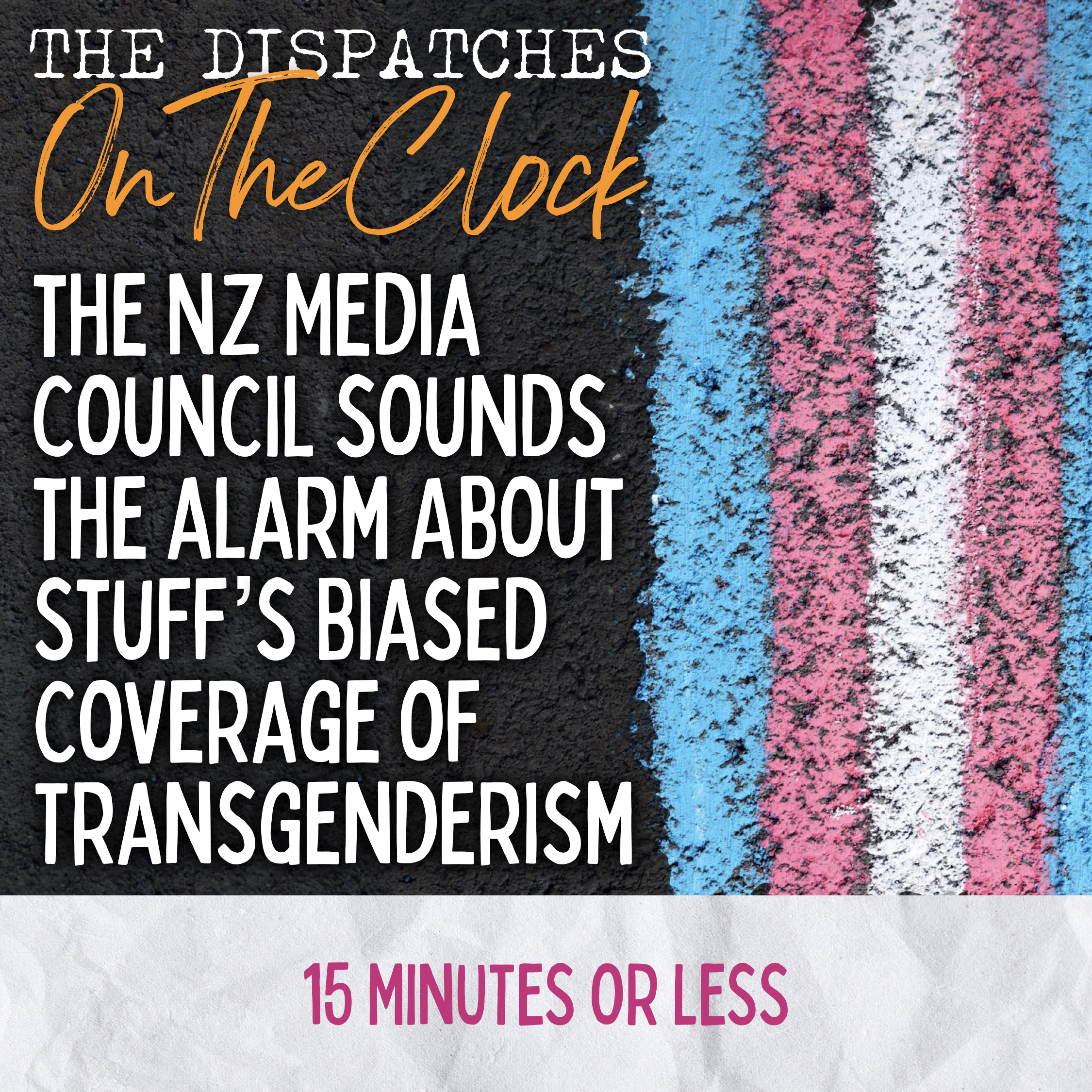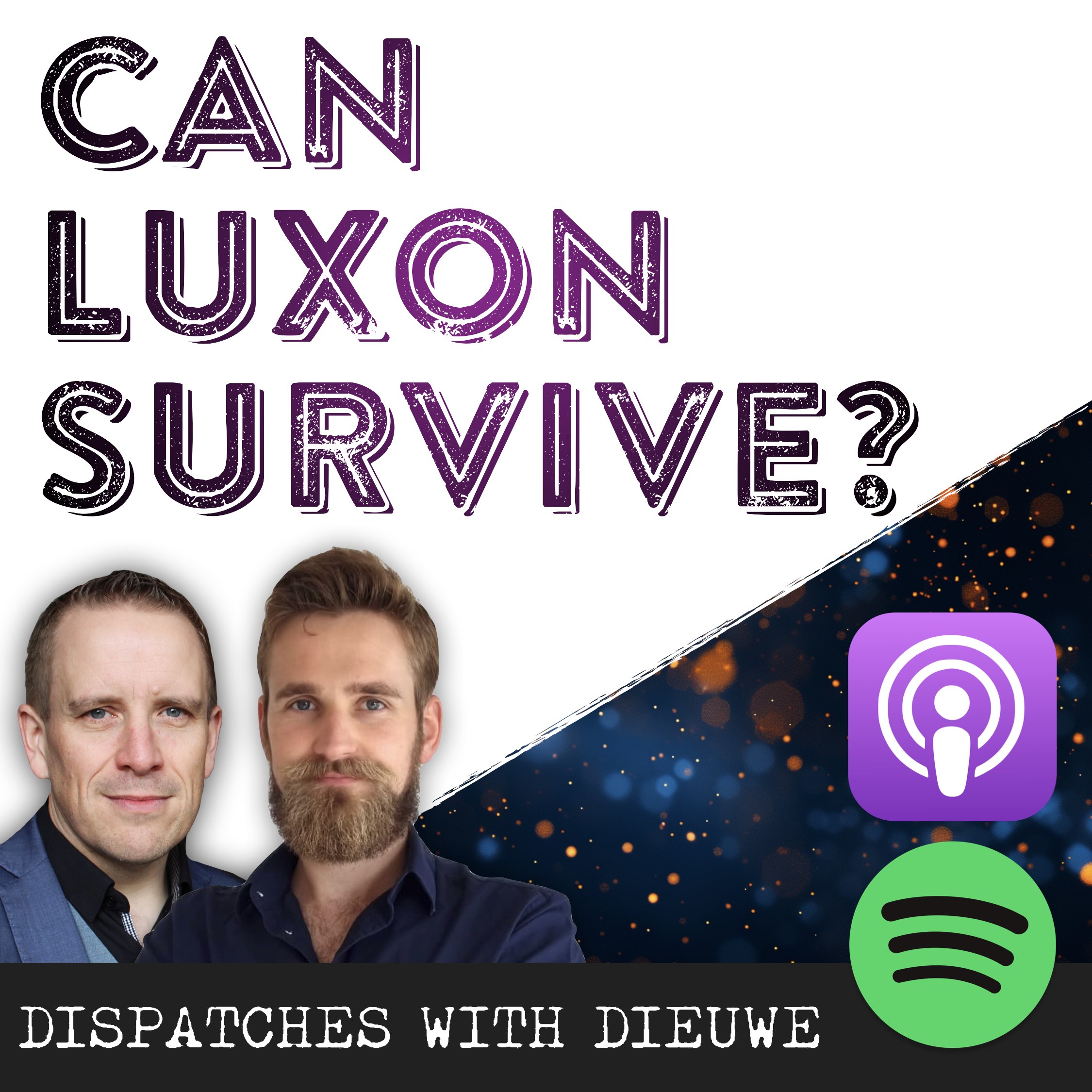[00:00:00] Ladies and gentlemen, start your stopwatches because you're listening to the dispatchers on the clock. And that means we're gonna spend the next 15 minutes or less. Okay, so this is another one of those episodes where we're probably going to take a little bit longer than 15 minutes. But I think it's totally worth it because today we're going to be talking about why complaining about the culture war doesn't make a lot of sense.
[00:00:34] Okay, so in light of what happened last week in New Zealand, and then culminating last Saturday with that act of mob violence at a peaceful women's rights rally in Auckland, a lot of people have been talking about the specter of the culture wars coming to New Zealand. And this is not good. And we don't want the culture wars. And we shouldn't be importing other people's culture war into our country. Let me tell you why I think that's a flawed way to think about all of this. First of all, I should start by saying I don't actually like the term culture war. And I'll tell you why I don't, for a couple of reasons. Number one is, the term culture war, I think, emphasizes the fight rather than actually emphasizing what we might be fighting for. And one of the worst things that can happen in any war is people start warring and then all of a sudden they lose sight of what they're actually fighting for. And it just becomes then about the fight. And that's never a good thing. And very quickly it often devolves into the end, justifies the means. You do whatever you have to do to win the battle. Secondly, the term culture war implies that this is nothing more than an arbitrary power struggle between two groups. Or maybe there's more than two groups, but it's just an arbitrary power struggle. And whoever's the most powerful, they get to win. Ironically, that's actually a bit of a Marxist view of history and what's going on. That history is just a constant state of power struggle. It's not really that at all. It's actually much more important than that. And I think that we'd be far better served if we understood this and thought about this as actually cultural decline, or maybe even in some cases cultural collapse versus culture building and culture cultivation. So cultivating a culture versus revolutionary actions which are trying to tear down existing cultures and existing tradition. And I think that's a much better way of actually thinking about it. And this is, by the way, where I think authentic conservatism comes in because it has what other political ideologies actually lack. It has a rear view mirror and a pair of binoculars at all times. What I mean by that is it's looking back to the past and forward constantly. It doesn't ever get into this false dichotomy pitting the past against the future. It doesn't ever get stuck in the here and now. As a result, it recognizes that there is a patrimony, a collection of wisdom, of goodness, truth and beauty, that we have received what we might call tradition, and that that tradition must be cultivated and cared for so that we can look ahead and build on that for those who come after us. So we're always in a mode of looking back and looking forward. And our actions today should be governed by a careful consideration of both of those factors. We also recognize that there is more to life than just this life. And so we don't try and create political utopias here on Earth. We have the ability to take a longer view, an eternal view, and to actually see that justice will be outworked in the next life if it isn't in this life. So we don't have to start wars and destroy people and start revolutions to get what we want. And it means we can actually, I think, be a bit more forgiving and ironically, a bit more tolerant when problems do arise. But if your whole focus is we must build our political utopia right here, right now, on this earth, then you are going to fight tooth and nail. You're not going to be forgiving, you're going to be far less tolerant. And really, that's what we're suffering under right now. I would argue the spoiler alert really is in the name. AuthentiC conservatism is all about conserving that which is good, true and beautiful. It is not simply about conserving the status quo. It's about conserving goodness, truth and beauty. And I think modern conservatism doesn't actually look right in a lot of places, particularly where we see it in the west, precisely because it's actually more like libertarianism. It is forgotten that it is supposed to be conserving something, and it is forgotten what it is supposed to be conserving. And so often conservatism, or people who claim that they are conservatives are really espousing more libertarian type doctrines, and that's not what conservatism actually is. So let me tell you about why I think complaining about the culture wars is flawed. And there are a couple of reasons for this. Number one, this sort of complaint is built on the assumption that cultures are somehow self correcting. There's basically an implicit assumption here that there's nothing to complain about. If we don't disagree, it will all sort of just sort itself out. Right? Because what's the other alternative? That people are saying that we should just surrender to cultural collapse? I don't think they believe that. I think people probably genuinely believe, well, if we don't fight then, and we don't disagree, and we don't have heated debates about these things, then somehow there'll be a bit of a correction, that somehow things will course correct. You know, the old pendulum swinging metaphor, I actually don't think that's a particularly helpful metaphor at all. It's actually a really Hegelian idea. This is Hegel's dialectical, that you have a thesis and then you have an antithesis, and there's a struggle between the two, and that gives rise to synthesis. And this struggle, the overcoming of the struggle, is what brings us and progresses us forward. But that's not actually a correct view of history at all, and it's certainly not how culture works. I would argue that culture is actually like a garden, and what that means is you've got to care for it. So if you don't look after your garden properly, you're going to be in trouble. If you plant poison ivy in your garden, people are not going to eat, they're actually going to get hurt. If you don't tend the garden, then weeds will take over. Predatory birds and insects will take over. If you don't care for and fertilize the crops that you plant in your garden, they will die or they will produce bad fruit. That's what a culture is like. It requires proactive considered and constant cultivation by those who are part of it. Goodness, truth and beauty. Second reason why I think it's flawed to complain about the culture wars is because it's actually a bit of a contradictory thing to do. It's a contradictory idea to complain about the culture war, because what you're really saying is, well, these things don't matter, other things matter more, and we'll come to that point in just a second. But what you're doing when you actually do this is you're saying, I'm fighting for my vision of what I think our culture should actually be. It should be a culture without culture wars. So you see, you're actually engaged in a bit of a struggle for the soul of your culture when you put forward and advocate that there shouldn't be culture wars. I know that might seem strange, but there is a contradiction, there's a bit of an inherent contradiction there, that everyone does have a vision for what they think the culture should look like, and they are advocating for that vision of culture. No one is above that or exempt from that. Even people who say, well, I don't want the culture war to come here. Number three reason why I don't think it makes much sense to complain about the culture wars is because I think it actually invites indifference about the state of society. And that's never a good thing. What it's often saying is, just live and let live. Let's just not have the debates. It's much better if we all just get along rather than actually debate what is true, what is good, and then perhaps do the hard work of orientating ourselves to tHat. It's better to be indifferent. It's better not to have the conflict. Now, conflict is never an enjoyable thing, but sometimes conflict is absolutely a necessary thing. The question is, really, is what's at stake? Is the conflict actually something that should be happening, or is it mere selfish ambition and conflict for all the wrong reasons? Fourth reason why I think complaining about the cultural wars is flawed is because it wrongly implies that the issues being debated don't actually matter, that these questions are not really that meaningful because you don't ultimately fight about things that don't matter. That's a pointless thing to do. And there's very much often that sort of vibe in the way people talk about this issue when they complain about the culture wars. But these things do actually matter. They really matter a lot. It's not simply a matter of us living as autonomous, self, choosing individuals, and suddenly culture will write itself. There's a lot more at stake here. And so we need to be considered about what our actual culture looks like. I think one of the big struggles we have today is this sort of middle ground fallacy where it's like, well, the truth is probably somewhere in the middle. So one side says X, another side says Y. Well, the truth is probably somewhere in the middle. Now, don't get me wrong, there are actual examples, real examples, where you can say, well, the truth is probably somewhere in the middle. So let's say you have a husband and a wife who divorce each other, and they're both claiming that the other person was the cause or the fault of the divorce. And it's not uncommon in that situation to find that there are faults on both sides. For example. So you could say, well, the truth is probably somewhere in the middle. That would be a classic example of where that would be true. But in this case, a lot of what we're talking about here, I don't think that's valid at all. So let's imagine, for example, someone proposed and suggested that all human beings are actually really chickens, and that we should be teaching this in schools and our children should be taught that human beings are really chickens and that those who want to should be allowed to embrace their new chicken identity and live their true chicken selves, and we should help them and we should give them wing implants and stuff like that. Now that would be a very bad idea. But let's say someone else turned up and said, no, that's a bad idea. And then a third person turned up and said, well, actually, I think we should try for the middle ground here. The truth is somewhere in the middle, that person wouldn't be correct. They would also be wrong. It would not be right to say, let's have a middle ground on the position that human beings are chickens versus the position that human beings are not actually chickens. And why I think this point really matters is because we are in a culture. In a lot of ways, I think that has collapsed. We aren't just disagreeing about ideas anymore. This is something different that's going on now. We are now disagreeing about the very nature of reality itself. And so you think about what happened last week in New Zealand and culminated with that violence last Saturday. You have trans identifying ideologues who have a very clear vision of what they believe reality to be. And then you have a group of women's rights activists who are trying to advocate for positions that are built on a fundamental, and I would argue, very humane and true vision of reality that is a complete contradiction to the vision of reality that the trans identifying ideologues are trying to argue for and fight that our society should embrace. That's what they're fighting for. They want us to embrace their vision of reality. Now, there is no middle ground here. There is actually a very serious question about what is reality. And you can't straddle the middle ground on this. The norms have to be the standard. So what I would argue is that we have to always, if we want to flourish as human persons, fall back on what is true. And it is true that there is male and it is true that there is female. And there are a minority of people, sometimes because of perhaps physical or birth defects or discrepancies, who don't quite flourish in the fullness that is the norm that everyone else, the majority absolutely experience. This is the norm. Or you have people who maybe experience some sort of psychological confusion. They have a psychological disconnection between their mind, and they don't feel right about their body. But that does not mean that the trans identifying ideologue vision of reality is true at all. Just because you have exceptions to the rule, those people don't represent a brand new sex. Those people are not proof that gender is not inherently and intimately and profoundly in some essential way tied to our bodies, to our biology.
[00:13:14] There actually is quite a serious question here, and you can't just sort of say, well, it doesn't really matter, or let's not have the discussion, or let's take the middle ground. I would argue, actually, that with this particular issue, we are clearly in the middle of something that has all the hallmarks of a social contagion. And this is where tradition really matters. Because tradition, it gives you a compass to know and to orientate yourself in the present a lot better if you've got a whole lot of wisdom and history that you are connected to. And that's what tradition does for you, is you are able to recognize and to use that as your measure to judge exactly what is happening right here in the here and in the now. And you're able to recognize things like, for example, go back about seven or eight years. We did not have a considerable and very, very noticeable growth in the number of young people who are now claiming that they're not really the biological sex that they were born into, that they're actually born into the wrong body, and they should be identifying as a male when they're a female or a female when they're a male, et cetera. This is clearly a social contagion. Now, there might have been examples you could point to throughout history, this moment, that moment, but we've never seen it like this before. This is absolutely. It's got all the hallmarks of a social contagion. And not just that, but the entire ideology is one of contradiction. It contradicts reality. It contradicts itself. It is inherently self contradictory. Think about the concept of transitioning. How does transitioning make any sense at all? How does it make any logical sense? If the fundamental claim of the transgender ideology is true and the fundamental claim of the transgender ideology is that gender is completely separate to the body, that gender is not connected to biology, that gender and genitals are two completely separate, and they are not connected at all. And therefore, because they are two separate things, you can be someone of a different gender, even though your genitals are the genitals that don't belong to that gender. Now, if that claim is true, then why is it that when people change their gender, they immediately set about transitioning themselves, their body in some way? The fact that you transition is you proving to the world that you actually instinctively believe that your genitals, that your physical body, is actually in some way very essential to gender. And so therefore, when you change your gender, you have to also change your body. If the central claim of the transgender ideology was true, that gender and biological sex, that gender and our bodies are not actually the same thing at all, they're two completely different things, then when you change your gender, you would not need to change your body at all. You could happily be a different gendered person living inside a body which was ultimately a meaningless lump of clay. It doesn't matter whether it's got penis and a testicles or a vagina and a womb. That's irrelevant. If the transgender ideology is true, it also contradicts itself another way in its outworking. What it does is it claims that you, as an individual, have the right to self create yourself however you like, and no one else can actually tell you or demand that you conform to outside objective norms. No. You know who you are. Your identity is paramount, and you self create that identity. I believe I am a woman trapped in a man's body, et cetera. But here's the thing. That very same ideology, which claims it's all about this radical autonomy and self creation, then also turns around and tries to claim, on the one hand, that it's subjective, but then it acts with unbending, objective fervor on the entire community, and it demands that the entire community completely identifies with its vision of reality. The very fact that this ideology calls me a cis male, it's a term, by the way, that I completely reject because I'm a man. I'm a male. I'm not a cis male. But the fact that that ideology calls me a cis male is them doing exactly what they demand other people don't do. They are now identifying us according to their vision of reality, not the way we want to be identified. I guess the big point here is this. Without truth, there is no freedom. And a freedom without goodness is not authentic freedom. And it's becoming increasingly undeniable. I think that liberalism has failed us. Liberalism failed to recognize that human beings are intrinsically communal. It treated them as radical, autonomous reasoning, self choosing individuals. But that's not actually who we are. We are brought into existence by community. We don't bring ourselves into existence. We can't bring ourselves into existence. We need a community to bring us into existence. We live in community and we can only flourish in community.
[00:18:41] We are not individuals. We are communal by nature. And because of this failing on the part of liberalism, this then opens the door for the extremes that we are now seeing. You have this radical autonomy doctrine that exists precisely because of the foundation that liberalism built for it and allowed it to flourish on top of. And also liberalism is now powerless in the face of this to actually give a coherent and meaningful response. And all liberalism does is it says things like, it produces slogans like, as long as it's not harming anybody else. But here's the thing. This is built on an assumption that we're all just autonomous, self choosing individuals and not communal. Because if we are inherently communal, then our actions are never just individualistic. They also have an impact on the community, which we constantly interact and rely on and without which we couldn't flourish. So our individual actions are always also communal actions as well. They have a bearing on the community. It's kind of like saying that the local swimming pool could have a urinating and a non urinating section of the pool. And if you don't want to urinate in the pool, then just go down the other end of the pool and you'll be fine. You see how that wouldn't work. The same is true here when you say things like, well, as long as they're not harming anybody else. And trans ideology is actually proof of this very harm to the community and how this is playing out now, the whole reason you have peaceful women's rights advocates now having to try and make their case for the fundamentals of a humane and reality focused vision of society is precisely because of the harms that are playing out in the community as a result of this particular ideology. You see, previously, we orientated ourselves towards objective truth. And then those objective truths gave rise to communal obligations. And as a result of those communal obligations, individuals could claim personal rights as a result. So I'll give you an example. We believed in the objective truth, that human life was sacred because every human being was made in the image of God. And what that meant was that that gave rise to an obligation to the community. The community must respect the image of God. So every single human person has dignity that must be respected. You can't kill them arbitrarily. You can't steal their stuff. You can't enslave them, et cetera. So individuals, as a result of those communal obligations, are able to claim for themselves, then personal rights. They're able to say things like, hey, you can't treat me this way because I'm a human being. But what liberalism did was it completely flipped the script. It put the autonomous, self choosing individual at the center, at the top of society. And what we ended up with is a framework now where individuals can create or choose their own subjective truths. The individuals then claim their desires as absolute rights as a result of creating their own truth, their own version of reality. And then the community must now subvert itself to the most powerful group of individuals who is claiming rights. What you've ended up with ultimately is might makes right instead of truth and goodness make right. I guess the whole point to try and wrap this up is that societies and communities can't remain unified, and they can't flourish if they don't coalesce around a big idea. And that big idea has to be transcendent. It has to be sacred. It has to be religious. Without that, you cannot coalesce together and form a unified, flourishing human society. It is increasingly clear that that is the case. And when we lose sight of that truth, a cultural decline or collapse is inevitable. So what this means is that cultivation, nurture, and building of a culture of goodness, truth and beauty becomes more important than ever before. That is where we are at. That's the stage our society is at right now. You might have heard people talk about the phrase late stage capitalism. I would argue we're in late stage liberalism. Our culture is in decline. And so what we need is people who are cultivating, who are nurturing, who are building actively and proactively, a culture of goodness, truth, and beauty. And the way we avoid the whole war part of a culture war, the fighting and the obsession with fighting, is we need to do this with integrity. So it must be lived. It's not just something we talk about. We must actually live this culture of goodness, truth, and beauty. It must be done with humility. We must recognize the human dignity of every person, and in particular where often we attempted to not do this. We must always keep at the forefront of our mind the human dignity of the people who disagree with us, even the people who disagree with us the most strongly and viciously, they are still made in the image of God. We must respect their dignity. We must have humility in our dialogues and debates. We must have prudence. We need to know when to speak and when not to speak. And most importantly of all, there must be charity. There must be civility. This must be done with authentic love. Love for goodness, love for truth, love for beauty, love for the human person and for human dignity. When we are dialoguing and debating about these issues. But these issues matter. They must be debated. And sometimes that debate will have to be quite robust. And guess what? Sometimes we cannot land on a middle ground. It's just that simple. Because we are now talking about competing visions of reality. Let me finish with a quote from Sophie Scholl. I love this quote. It's one of my favorites. The real damage is done by those millions who want to survive, the honest men who just want to be left in peace. Those who don't want their little lives disturbed by anything bigger than themselves. Those with no sides and no causes. Those who won't take measure of their own strength for fear of antagonizing their own weakness. Those who don't like to make waves or enemies. Those for whom freedom, honor, truth and principles are only literature. Those who live small, mate Small, die small. It's the reductionist approach to life. If you keep it small, you'll keep it under control. If you don't make any noise, the boogeyman won't find you. But it's all an illusion because they die, too. Those people who roll up their spirits into tiny little balls so as to be safe. Safe? Safe from what? Life is always on the edge of death. Narrow streets lead to the same place as wide avenues, and a little candle burns itself out just like a flaming torch does. I choose my own way to burn. So with that in mind, let's get out there with integrity, humility, prudence and love and have important conversations. They need to be had. And if we have learned anything from last week, it's really, really apparent to me that some of these conversations are now more important than they have ever been before. Get courageous. Discover your backbone, start having the conversation, but always make sure that you are living that culture as well as talking about it. Thanks for tuning in. If you want to support our work and get access to more than 12 hours of exclusive content every single month, then just become a patron of our
[email protected]. Left FootMedia the link is in today's show notes. If you contribute $5 or more per month, you will get access to 12 hours of exclusive patrons only content every single month. Don't forget, live by goodness, truth and beauty, not by lies. And I will see you next time on the dispatchers on the clock is brought to you by Left foot media Support our important independent media
[email protected]. Forward Slash Left Foot Media with just $5 or more per month, and you'll receive exclusive access to our full length patrons only episode of the Dispatchers podcast every single week. That's Patreon.com.
[00:27:14] Left Foot Media Link is in the show notes.
